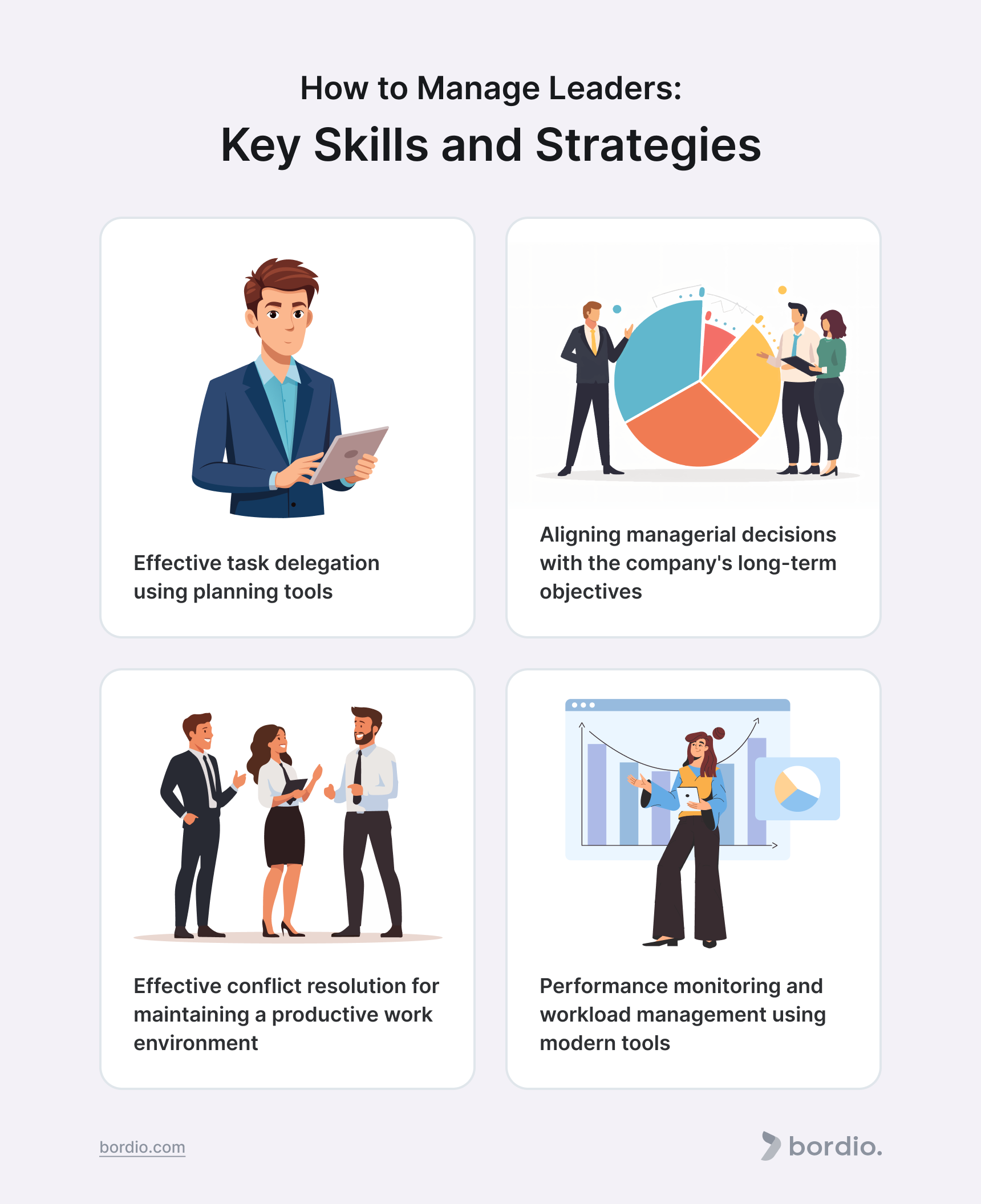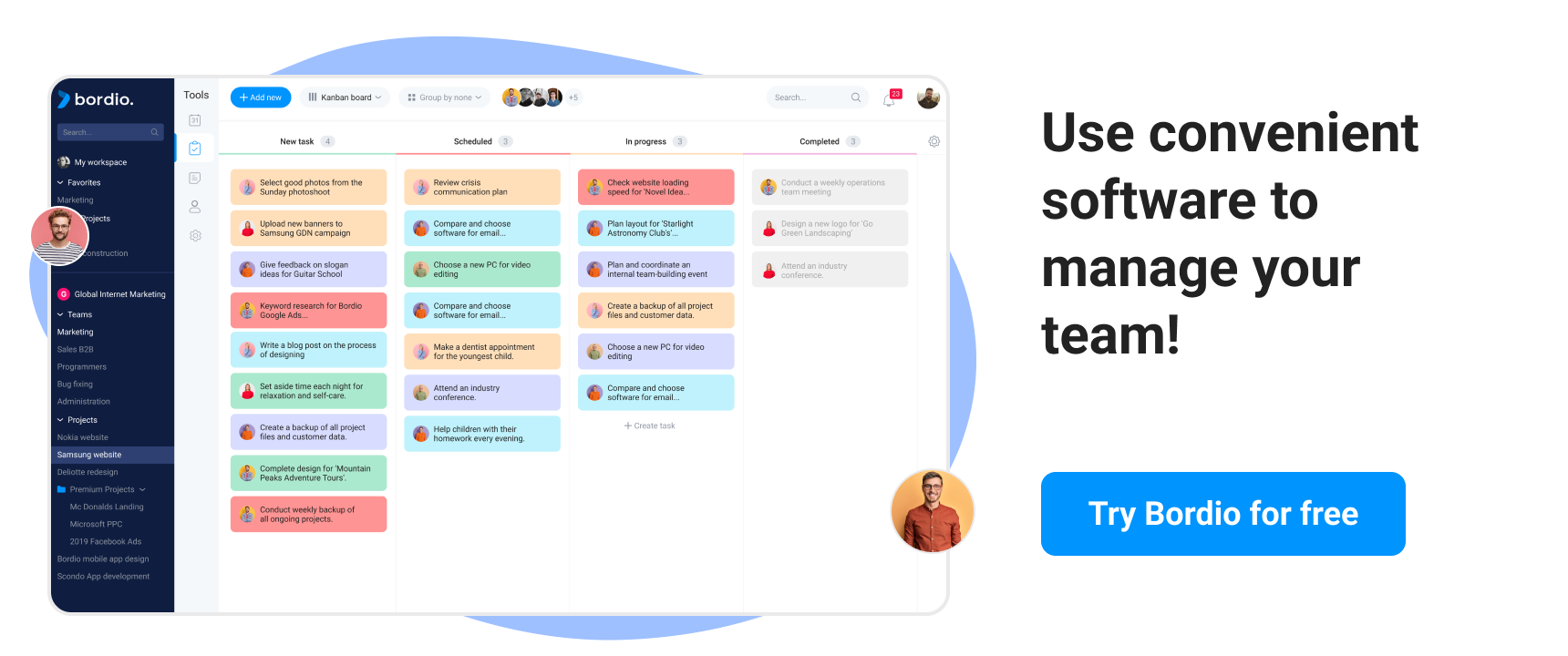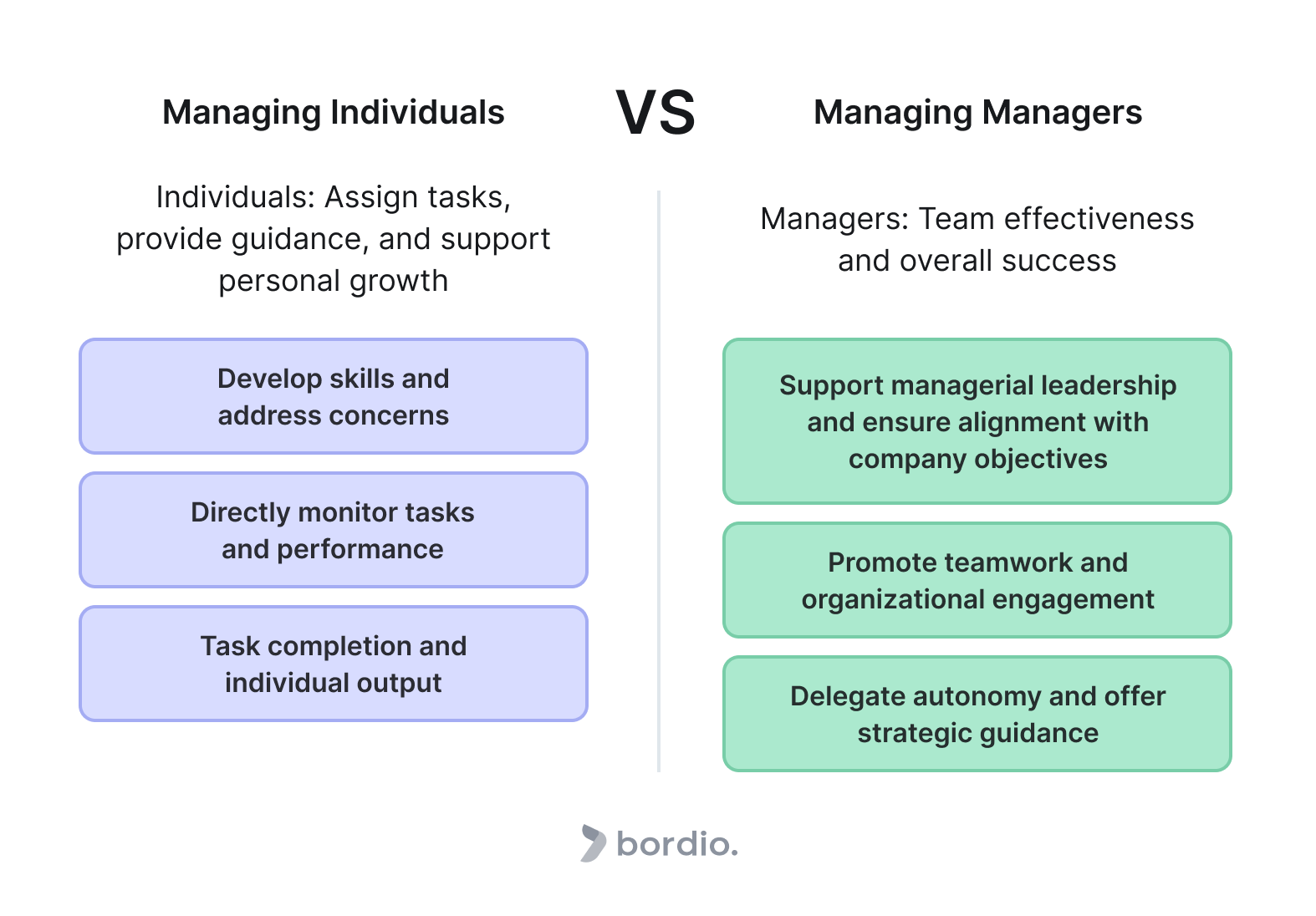A manager who oversees other managers, also called a senior manager or senior supervisor, is essential to how organizations work, especially when the organization grows and teams become more extensive and complicated.
These managers ensure that top leaders’ big goals and plans get passed down well throughout the whole organization. They take those high-up plans and make them into real, doable plans in their project management tools, making sure everyone’s working towards the same big picture. As teams get bigger, managing money, people, and time becomes super important. It may sound simple, but these managers watch over how resources get managed and used, making sure everything runs smoothly and building trust.
Necessary skills for managing managers
What skills are needed to successfully manage managers?
Delegation
Delegation is an essential skill that team members, managers, and senior managers should use. As a supervisor, you should be able to delegate tasks to managers. This process involves task prioritization, assigning tasks, and balancing team workload.
What other advantages does delegating responsibilities to managers have?
- When you assign tasks to managers, the workload is shared, allowing the supervisor to focus on important things.
- Assigning tasks helps them learn by solving different problems, which helps them grow.
- It helps managers become better leaders, like building trust and coordinating teamwork.
Bordio – a task planning tool for teams, can be incredibly useful when delegating responsibilities. With Bordio, you can centrally store all information about tasks, projects, deadlines, and responsible members.
If the entire team has access to a common space for task tracking, where they can see current and upcoming tasks, their statuses, and due dates, then the delegation process will become more transparent and manageable. A manager can use Bordio as an online team management software to allocate tasks among team members easily. You can assign responsible managing individual contributors, set due dates in a few clicks, and attach necessary instructions or resources to each task.
Strategic thinking
Senior managers are responsible for guiding the ship toward a shared goal while juggling the complexities of day-to-day operations. Understanding how each manager’s team contributes to the business’s overall goals is super important. This means figuring out what each team does within the company and ensuring their goals match the company’s mission and vision. In such conditions, to deal with multiple projects and balance tasks, it is important for you to have strategic thinking skills.
Managerial decisions should always align with the organization’s long-term objectives. This entails considering both the immediate results and their possible influence on the business’s growth and success. By guaranteeing that each managerial activity advances the attainment of these overarching goals, you establish a unified and intentional organizational framework.
Additionally, managing managers entails looking forward to seizing opportunities and obstacles. This proactive strategy enables efficient planning and resource allocation to accomplish strategic goals.
Coaching and mentoring
Effective coaching and mentoring of managers are critical competencies for managers. How do you become a good mentor and leader? There are several points:
- Give Constructive Feedback: Managers must receive regular feedback to identify their areas of strength and growth. It’s critical for managers supervising other managers to provide growth-oriented, practical, and precise feedback. By highlighting areas of success and areas that require development, managers can be encouraged to improve their performance.
- Take Part in Coaching Talks: Coaching talks allow you to discuss goals, development possibilities, and managerial difficulties more deeply. As you actively listen to managers’ goals and worries, provide direction and counsel based on your personal experiences and areas of expertise. Urge managers to consider the consequences of their actions and investigate methods for overcoming challenges and succeeding.
- Provide Learning Opportunities: Managers must have access to learning and development opportunities for their careers to flourish. These can include seminars or workshops, training sessions, or even one-on-one mentoring with more seasoned executives. Encourage managers to seek ongoing education and personal growth and offer them the necessary time management tools and assistance.
Conflict resolution
Conflicts between managers or within their teams can happen for various reasons, such as different ideas, problems with talking, or disagreements on what’s important. Handling these conflicts well is important to keeping the work environment happy and productive.
Tip: Productivity may seem hard, but not when you know 22 useful productivity tips for everyone!
Knowing that conflicts happen sometimes is the first step in fixing them. Managers might have arguments with each other or face challenges with their teams that need to be dealt with quickly and carefully.
Managers should be good at problem-solving and keeping the peace. Resolving conflicts involves listening to everyone, understanding their views, and finding solutions for all. Handling conflicts promptly and fairly prevents them from escalating and causing team problems. Skilled managers create a trusting, collaborative workplace where tasks are accomplished. Managers strengthen their teams and drive organizational success by fostering open communication, respect, and proactive conflict resolution.
Workload and performance management
Keeping an eye on how managers and their teams are doing is important for good management. It means checking regularly to see if everyone’s doing their job well and if it matches what the organization wants to achieve. Having clear goals gives managers and their teams a clear path to follow. By setting goals that they can measure and that match what the organization wants, managers can lead their teams to success.
Implementing tools like Bordio is another important brick when building good performance management, especially when managing your team’s workload. In Bordio, creating and assigning tasks, setting time, and creating time blocks for clear and productive workload management is easy. Then, you can see all tasks on your calendar, which makes it easy to control and analyze your workload and performance simultaneously.
Communication
Talking clearly and openly is super essential when managing managers. You’ve got to explain the company’s goals and what’s expected from everyone. Keeping communication open also helps managers share feedback and work together better.
Bordio provides opportunities for communication within the team by using notes, commenting on tasks, and sharing feedback in chat. This work management software promotes more effective teamwork and allows participants to share ideas, ask questions, and give feedback.
In addition to direct reports, one important level of communication is group and personal meetings and feedback sessions. Team meetings are important because they let everyone share information, discuss ideas, and work together better. They’re a chance for open conversation, making sure everyone knows what the goals are and fixing any problems that come up.
Differences between managing individuals and managing managers
It takes a more hands-on approach to managing individual employees, concentrating on job fulfillment and personal and career growth; managing managers calls for a broader view, emphasizing strategic decision-making, teamwork, and overall organizational performance.
1. What to do
- Managing individual employees: Supervisors work closely with each worker, assigning tasks, offering guidance, and supporting them to do their best. Tools like a project tracking board can be instrumental in this process by visualizing task progress and ensuring alignment with goals.
- Managing managers: Leaders oversee the performance of the managers they supervise, supporting them in leading their teams effectively and aligning with company goals.
2. Where to focus
- Managing individual employees: The focus is on helping employees enhance their skills, addressing their concerns, and ensuring job satisfaction.
- Managing managers: Emphasis on fostering collaboration among the management team to ensure harmonious work and engagement towards organizational goals.
3. How much to control
- Managing individual employees: Supervisors typically exercise direct control over the tasks assigned to each worker and monitor their performance closely.
- Managing managers: Leaders make broader decisions impacting the company, delegate more autonomy to managers, and provide guidance and oversight as needed.
4. What to care about
- Managing individual employees: Focus on task completion and individual performance.
- Managing managers: Prioritize creating a positive work environment, ensuring the management team’s effectiveness in driving company success and employee satisfaction.
Solving frequent mistakes of new directors
Determining whether a new manager or director is having trouble managing managers is critical in resolving any underlying problems and guaranteeing the team’s success. A bad attitude toward the position or the team may indicate discontent or difficulties adjusting to the new duties. Overload may indicate the need for assistance in properly managing workload or setting priorities, as demonstrated by stress-related behaviors or difficulties keeping up with tasks. A project management board can help monitor progress and identify potential issues before escalating. Furthermore, if subordinates’ input is consistently unfavorable or raises questions about the leader’s efficacy, it should be addressed and used to strengthen managerial abilities. So, what are the most common mistakes new supervisors and directors make?
#1. No change in routine
The solution:
- Encouraging new approaches and work strategies.
- Providing collaboration tools for time management and task prioritization, such as Bordio.
- Conducting training programs to develop leadership skills.
#2. Poor time management
The solution:
- Suggesting methods and strategies for effective time management.
- Providing access to tools for planning and organizing tasks, such as Bordio.
- Training in the skills of prioritization and delegation of tasks.
#3. Reluctance to take on a leadership role
The solution:
- Providing support and incentives to develop leadership skills.
- Organization of training and seminars on leadership and personnel management.
- Creating conditions for the growth and development of leaders within the organization.
Five main tips on how to manage managers
Moving from managing people who do the work to managing other managers means changing how you think and work:
Trust your managers and give them space
Trusting your managers and giving them space to operate is essential for effective leadership. When making decisions, a manager-leader should respect the autonomy of their team and have faith in their talents. A competent leader knows and values the differences in every manager’s style rather than micromanaging and forcing their own on everyone.
Celebrating this diversity of management approaches is essential for companies to promote a creative and dynamic work atmosphere. Every manager brings unique talents, insights, and experiences to the table that help the team succeed. A leader helps managers thrive and significantly contribute to the company by empowering them to use their skills and qualities.
Encouraging managers to conform to their preferred style of practice also fosters a sense of accountability and ownership among the team members. Managers are better able to take the initiative, find innovative solutions to challenges, and produce outcomes when they feel encouraged and trusted in their methods.
Establish regular meetings
It is imperative that you hold regular meetings with your supervisors. They guarantee that everyone is working toward the same objectives, promote collaboration, and assist in keeping everyone in agreement. At weekly meetings, you can solve problems, discuss priorities, and check in on the status of things. These meetings allow you to discuss updates, trade ideas, and gain management input. They also guarantee that all individuals know and comprehend what is happening within the firm. During these meetings, the work task manager can help track progress and ensure that all tasks are accounted for.
Additionally, one-on-one meetings allow middle managers to have more intimate conversations about their performance. You can assist them, offer guidance, and resolve any problems they may be experiencing. Meetings let managers talk to each team member individually. During these sessions, it’s possible to find solutions to each person’s issues, talk about how they’re doing, and provide constructive criticism. Through one-on-one conversations, for example, managers can gain insight into each employee’s perspective, areas of strength, and areas for improvement. Because of this, everyone feels supported and encouraged at work.
Regular meetings with your supervisors also help you develop stronger relationships with them. Establishing a consistent communication schedule and cooperative efforts fosters mutual respect and trust among team members.
Regular meetings also enable you to monitor progress and implement required adjustments. They assist you in overcoming obstacles and guarantee that everyone is working toward the same objectives.
Become a coach
Being a coach entails letting go of control and taking on more of an advisory role. You engage in conversations, listen to your team, and pose questions to encourage people to solve problems independently.
Believing in and assisting each person in realizing their potential is the cornerstone of coaching. It’s your responsibility to establish a secure space for learning and development where everyone feels comfortable. The core of coaching is providing individualized assistance. Together, you identify each team member’s advantages and disadvantages and create plans to support their development. In addition to providing feedback, a coach can help clients view things differently and inspire them to attempt new things and take risks. You establish a culture in which errors are viewed as chances to improve.
Being an effective coach requires ongoing learning. You seek opportunities to enhance your coaching abilities through education or self-discovery. You constantly strive to improve so that the rest of your team can, too.
Don’t criticize in front of the team
Speaking poorly of a manager in front of the players is not smart. This might negatively impact teamwork and morale. It also makes the manager appear less in control and hinders their ability to take the lead. A manager’s public criticism might leave the team feeling uncertain and uninspired. They can come to believe that they cannot trust the manager as a result. This may make it more difficult for people to cooperate and complete tasks.
It may also deter team members from contributing their thoughts or speaking up. They may be unable to be imaginative or collaborate effectively because they fear embarrassment or punishment.
Speaking with management privately if you have concerns about them is advisable. In this manner, you can have an open discussion without hurting anyone’s feelings. You can also listen to what they say and offer advice on how they might improve.
When providing criticism, point out specific areas where they can improve rather than merely pointing out flaws. Provide examples and listen to their point of view as well. In this manner, you can collaborate to get better without offending anyone.
Develop yourself
And the last thing is, of course, self-improvement! Investing in your growth is essential and shows your managers how to do the same. As a leader, your team watches you closely for guidance. It could mean attending classes, joining meetings, or finding people to teach you more. When you work on yourself, you show you’re willing to change and learn new things when needed. This makes you a better leader and makes your managers trust and respect you more.
Moreover, you can help your managers do the same when you keep learning. You can share what you’ve learned with other leaders, give good advice, and help them improve their jobs. This way, everyone on your team can grow together and do better work.









